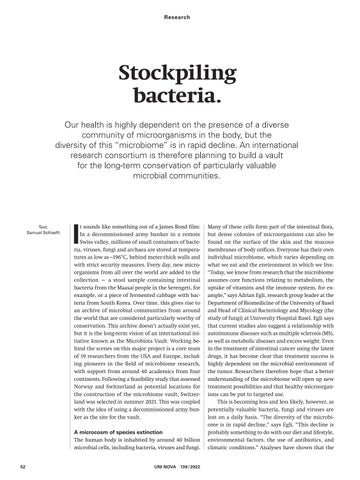Research
Stockpiling bacteria. Our health is highly dependent on the presence of a diverse community of microorganisms in the body, but the diversity of this “microbiome” is in rapid decline. An international research consortium is therefore planning to build a vault for the long-term conservation of particularly valuable microbial communities.
Text: Samuel Schlaefli
I
t sounds like something out of a James Bond film: In a decommissioned army bunker in a remote Swiss valley, millions of small containers of bacteria, viruses, fungi and archaea are stored at temperatures as low as –196°C, behind meter-thick walls and with strict security measures. Every day, new microorganisms from all over the world are added to the collection — a stool sample containing intestinal bacteria from the Maasai people in the Serengeti, for example, or a piece of fermented cabbage with bacteria from South Korea. Over time, this gives rise to an archive of microbial communities from around the world that are considered particularly worthy of conservation. This archive doesn’t actually exist yet, but it is the long-term vision of an international initiative known as the Microbiota Vault. Working behind the scenes on this major project is a core team of 19 researchers from the USA and Europe, including pioneers in the field of microbiome research, with support from around 40 academics from four continents. Following a feasibility study that assessed Norway and Switzerland as potential locations for the construction of the microbiome vault, Switzerland was selected in summer 2021. This was coupled with the idea of using a decommissioned army bunker as the site for the vault. A microcosm of species extinction The human body is inhabited by around 40 billion microbial cells, including bacteria, viruses and fungi.
52
UNI NOVA
139 / 2022
Many of these cells form part of the intestinal flora, but dense colonies of microorganisms can also be found on the surface of the skin and the mucous membranes of body orifices. Everyone has their own individual microbiome, which varies depending on what we eat and the environment in which we live. “Today, we know from research that the microbiome assumes core functions relating to metabolism, the uptake of vitamins and the immune system, for example,” says Adrian Egli, research group leader at the Department of Biomedicine of the University of Basel and Head of Clinical Bacteriology and Mycology (the study of fungi) at University Hospital Basel. Egli says that current studies also suggest a relationship with autoimmune diseases such as multiple sclerosis (MS), as well as metabolic diseases and excess weight. Even in the treatment of intestinal cancer using the latest drugs, it has become clear that treatment success is highly dependent on the microbial environment of the tumor. Researchers therefore hope that a better understanding of the microbiome will open up new treatment possibilities and that healthy microorganisms can be put to targeted use. This is becoming less and less likely, however, as potentially valuable bacteria, fungi and viruses are lost on a daily basis. “The diversity of the microbiome is in rapid decline,” says Egli. “This decline is probably something to do with our diet and lifestyle, environmental factors, the use of antibiotics, and climatic conditions.” Analyses have shown that the
















